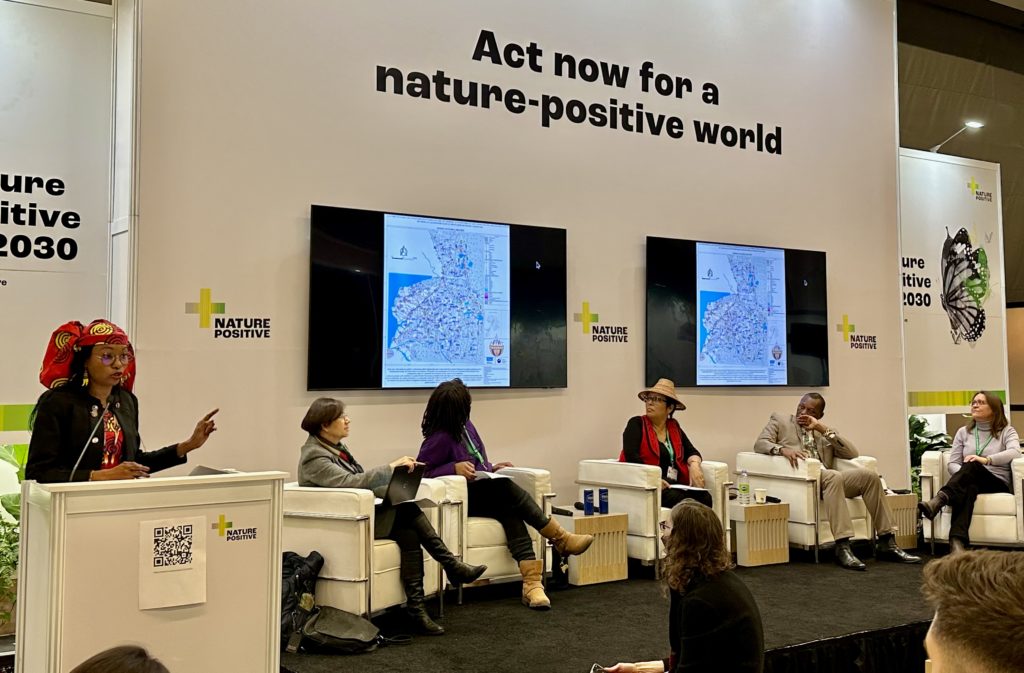By Bonnie Barclay
International Rivers joined partners at the UN Biodiversity COP15 meeting (7-19 December 2022) in Montreal.
After repeated delays due to the pandemic, decision-makers, country delegates, civil society organizations, and other institutions finally came together to discuss, negotiate and shape the post-2020 global biodiversity framework.
International Rivers and our partners’ message was clear: protecting rivers and other vital ecosystems and the rights of those who depend on and defend them must be central in any agreement in order to halt and reverse biodiversity loss. Destructive projects such as hydropower dams, water diversion projects, mining, and deforestation must be avoided at all costs.
Highlighting the importance of rivers and freshwater biodiversity

Our coalition also held a side event, “Pathways for Inland Waters in the Post-2020 Global Biodiversity Framework” with speakers highlighting the importance of rivers
- Hindou Ibrahim, Co-Chair of the International Indigenous Peoples Forum on Climate Change and founder of the Association for Indigenous Women and Peoples of Chad (AFPAT)
- Dr. Kina Murphy, Africa Strategy Lead for the Campaign for Nature
- Jean Hervé Mve Beh, Director General of Aquatic Ecosystems of the Ministry of Water and Forests of Gabon
- Christine Smith-Martin, CEO of the Coastal First Nations
- Maria Rivera, Ramsar’s Senior Regional Advisor for the Americas
- Shruthi Kottillil, Global Youth Biodiversity Network (GYBN) co-coordinator of the India chapter
“Freshwater ecosystems are the most degraded in the world with one in three fish species facing extinction and overall freshwater species/biodiversity decline more than double marine and terrestrial species. Urgent and targeted action is essential to reverse this trend.”
Indigenous leadership is critical to succeed in protecting biodiversity
Hupa Tribe member Danielle Franks
delivers her message at COP15
International Rivers and partners have been pushing for the inclusion of freshwater biodiversity and inland waters language and targets in the agreement as well as strong protections for Indigenous Peoples’ rights and territories and Rights of Nature.
“Indigenous lands make up around 20% of the Earth’s territory, containing 80% of the world’s remaining biodiversity—a sign Indigenous Peoples are the most effective stewards of the environment.”
The timing of COP15 was ideal for celebrating the recent news of the official approval of the Klamath Dams removal. This was a hard-fought decades-long campaign to remove the Klamath Dams and bring back the endangered Pacific salmon. This tribal-led victory with NGO partners, including International Rivers will lead to the largest dam removal and river restoration project in world history.
Global Biodiversity Framework agreement
Fortunately, after years of work and these past weeks of negotiations, the meeting ended with a global framework deal signed by nearly 200 countries.
CECIDE in Guinea brings the message
of local communities and biodiversity
that will be impacted by the Koukoutamba Dam
Due to the work on many, many of our goals were achieved, “inland waters, indigenous rights, rights of nature, ecocentrism are all included in this new landmark agreement, the Kunming-Montreal Global Biodiversity Framework
The framework aims to:
“By 2030: Protect 30% of Earth’s lands, oceans, coastal areas, inland waters; Reduce by $500 billion annual harmful government subsidies; Cut food waste in half”
Of course, the success will be in each country’s details and implementation. As our partner Bamba from CECIDE in Guinea reminds us, the threats to people and nature remain today with dams like the Koukoutamba Dam planned to be built in a national park.
To learn more about the Koukoutamba Dam (click here for English and French factsheet) and for more about the Hydropower’s Biodiversity Footprint click here.
A cause for river celebration
The week wrapped up with a celebration of the transboundary river cooperation between the Albanian and Greek governments and Patagonia on the protection of the last wild free-flowing river in Europe: Vjosa-Aoös River. The Vjosa-Aoös River is set to become establish Europe’s first wild river national park. Learn more about the hard work and dedication to make this happen.
Watch and see the beauty of the Vjosa-Aoös River.

